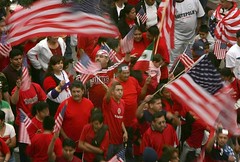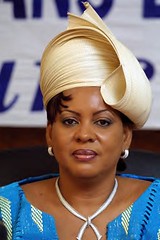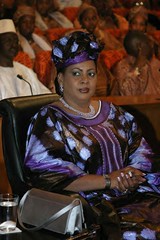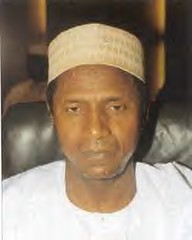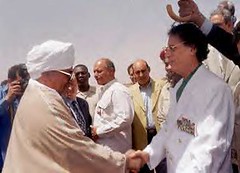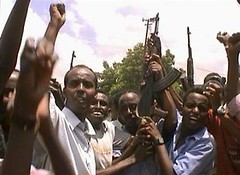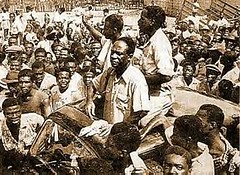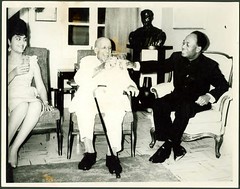
Ramona and Pam Africa of MOVE on April 27 during a brief stopover at Detroit Metropolitan Airport enroute to Paris. They travelled in order to commemorate the first year of a street named after Mumia Abu-Jamal in Saint-Denis. (Photo: Abayomi Azikiwe).
Originally uploaded by Pan-African News Wire File Photos.
Funds needed for the ad! See below
Dear Friends of Mumia,
This is an urgent appeal for funds to cover the cost of a full-page ad scheduled for publication in The Nation magazine. The add will appear two weeks before the scheduled May 17 oral arguments before the U.S. Court of Appeals for the Third Circuit.
The ad will raise funds for Mumia's legal and political defense. Initiated by The Mobilization to Free Mumia Abu-Jamal, it is the product of the joint effort of five Mumia solidarity organizations. The sponsors are listed and the text is self-explanatory. In the event that you cannot open the pdf file, we have included the ad in straight text below.
As you will note, we have secured a list of nationally prominent ad signers, from Harry Belafonte, Angela Davis and Alice Walker to Danny Glover, Howard Zinn, Lynne Stewart, Michael Ratner and several others.
A few days ago Mumia's lead attorney, Robert R. Bryan announced two important court victories. The first was a decision by the U.S. Court of Appeals to grant an additional hour to the time for oral presentations on May 17. This means that Mumia's attorneys will have a full hour, thus allowing time for the NAACP Legal Defense Fund and the National Lawyers Guild attorneys to present the material in their amicus curiae briefs in support of Mumia's central arguments.
Second, the same court rejected a motion by Pennsylvania prosecutors to recuse (remove) the entire Court of Appeals for the Third Circuit. The motion's spurious argument were, according to Robert R. Bryan, a cover to circumvent what is considered the second most liberal circuit court in the country and move the proceedings to a more conservative jurisdiction.
These two victories set the stage for the May 17 oral arguments and the mass demonstrations in Philadelphia and San Francisco on that date.
The Nation ad has all the details about these two critical demonstrations. As always, the Mobilization to Free Mumia believes that Mumia's life and freedom rests in our continued capacity to mobilize in massive numbers to make the price of Mumia's continued incarceration impossible.
Building the mass movement for Mumia coupled with the continuing battles in the legal arena are the best way to win the historic victory that Mumia's freedom will represent.
Please contribute generously to the publication of the ad. Note that the pdf file contains the two-color ad in the format prepared for The Nation: http://freemumia.org
In solidarity,
Laura Herrera and Jeff Mackler, Co-coordinators
The Mobilization to Free Mumia Abu-Jamal
415-255-1085
http://freemumia.org
[Note: "help 'em fry the n----r" is misspelled only to avoid email profanity filters that would prevent this message from reaching some recipients if the text were to be copied for email distribution]
Download the following ad here: http://freemumia.org
--------------------------------------------
ONE COURT DECISION:
EXECUTION OR THE ROAD TO FREEDOM
Stand with Mumia Abu-Jamal May 17 in Philadelphia
On May 17, 2007 Mumia Abu-Jamal's lead attorney, Robert R. Bryan, will present oral arguments to the U.S. Court of Appeals for the Third Circuit in Philadelphia. Despite a mountain of evidence of his innocence, a U.S. criminal "justice" system saturated with race and class bias has reduced his case to just four issues: exclusion of Blacks from the jury panel, racial bias, improper instructions to the jury regarding the death penalty and prosecutorial misconduct.
In a 1982 frame-up trial that has been condemned by groups and individuals including Amnesty International, the European Parliament, the NAACP, the National Lawyers Guild, President Nelson Mandela of South Africa, President Jacques Chirac of France, the Congressional Black Caucus, hundreds of U.S. and international trade unions and the Detroit, San Francisco, and Paris, France city councils, Mumia was falsely convicted of the murder of a Philadelphia police officer.
Six eyewitnesses stated that the real killer fled the murder scene while Mumia himself was found near dead next to the slain police officer. Critical evidence of Mumia's innocence was destroyed or withheld. "Witnesses" never at the murder scene were coerced to state that they were present. Police distorted events and material evidence at the murder scene. Mumia himself was excluded from the majority of his own trial.
Mumia was the victim of a political frame-up. He is an award-winning journalist, whose widely-respected social commentaries are today broadcast on 124 radio stations. In 1981, as a radio commentator and President of the Philadelphia Association of Black Journalists, he was a leading human rights critic of the Philadelphia Police Department, many of whose officers had been indicted and convicted on charges of corruption, witness intimidation and the planting of evidence.
Mumia's judge, Albert Sabo, was overheard by court stenographer, Terri Maurer Carter, to say in his antechambers about Mumia, "Yeah, and I'm going to help 'em fry the n----r."
Mumia has been on death row nearly 25 years. He has become a worldwide symbol in the fight against the barbaric and racist death penalty. Pennsylvania authorities seek, for the third time, to impose the death penalty and murder Mumia by lethal injection. We must make the political price of this execution and continued incarceration too high to pay. We stand with Mumia as he fights for his legal right to a new trial and for his life and freedom.
Join us in Philadelphia on Thursday, May 17, 9:30 am at the U.S. Courthouse, 6th and Market Streets, Philadelphia. On the East Coast call: 215-476-8812. On the West Coast, we mobilize at the U.S. Court of Appeals Building, 7th Street and Mission, San Francisco, 4-6 pm. Call: 415-255-1085
Pam Africa; Ed Asner; Harry Belafonte; Heidi Boghosian, Exec. Dir, *National Lawyers Guild; Angela Davis; Hari Dillon, President, Vanguard Public Foundation; Eve Ensler; Bill Fletcher Jr., Co-founder, *Center for Labor Renewal; Danny Glover; Frances Goldin; Rick Halperin, President, *Texas Coalition to Abolish the Death Penalty; Dolores Huerta; Barbara Lubin, Dir., *Middle East Children's Alliance; Jeff Mackler; Robbie Meeropol, Exec. Dir., *Rosenberg Fund for Children; Michael Ratner, President, *Center for Constitutional Rights; Lynne Stewart; Alice Walker; Cornel West; Howard Zinn *Organization listed for identification purposes only.
CONTRIBUTE TO THE EFFORT TO SAVE MUMIA'S LIFE!
Please make checks payable to: Mobilization to Free Mumia Abu-Jamal, 298 Valencia Street, San Francisco, CA 94103. - http://www.freemumia.org http://www.alerts@freemumia.org
____ Enclosed is my contribution of: ___ $1,000; ___$500; ___$250; ___
$100; ___ $50; ___ $25; ___other, to help pay for the cost of this ad and for Mumia's legal and political defense.
Name (Print) ________________________________________
Organization (if any): _________________ Title: ________________
Address: __________________ City: _____________ Zip: ___
Phone: _____ - ________ email: _________________________
Sponsors: The Mobilization to Free Mumia Abu-Jamal (Northern California); International Concerned Family and Friends of Mumia Abu-Jamal; Free Mumia Abu-Jamal Coalition (NYC); Chicago Committee to Free Mumia Abu-Jamal;
Educators for Mumia Abu-Jamal
OUR THANK YOU TO YOU!
On Tuesday, April 24th hundreds gathered at the American Friends Service Committee in Philadelphia on Mumia's birthday to mobilize for his highly anticipated oral arguments scheduled for May 17th. We would like to thank and congratulate all who came, including Danny Glover, Sgt. DeLacy Davis, Linn Washington Jr., Harold Wilson, Lynne Stewart and others, to show their uncompromising support as they did so in the face of a large FOP protest and building police terror which has resulted in death threats and extreme intimidation throughout the last few weeks. Your continued support is recognized and appreciated.
1. New publication from Journalists for Mumia
2. Journalists for Mumia’s coverage of April 24 in Philly
3. AWOL reports on April 24 in Philly
4. Chicago Event May 7 for Mumia!
1. ********PLEASE SPREAD THIS ANNOUNCEMENT FAR AND WIDE, so that the issues in Mumia's current bid for a new trial can be accurately presented, despite the long history of mainstream media bias!*********
The newly formed “Journalists for Mumia” is announcing the release of both our newspaper and our new website: Abu-Jamal-News.com
For the first time in the United States, we have published a newly discovered crime scene photo from December 9, 1981, that clearly documents police manipulation of the scene. View this photo on page five of this PDF version of our newspaper that has just been released:
http://www.abu-jamal-news.com/docs/ajn1.pdf
Because the 1981 crime scene photo taken by Pedro Polakoff is copyrighted, please do not reproduce the photo (at least for now). Please just share the photo by passing along the PDF file for viewing.
Journalists for Mumia has been formed to challenge the long history of media bias against Abu-Jamal’s case for a new trial. Through our print newspaper and website we are providing independent, non-sectarian, up-to-date news on the case.
The two feature articles of our first issue, written by Journalists for Mumia co-founders Michael Schiffmann and Hans Bennett, are expanded versions of articles by Bennett that appeared in the November 2006 edition of Z Magazine and other publications.
Mumia’s Battle in the Courtroom presents the facts directly relevant to the May 17 oral arguments. In contrast, Race Against Death presents the explosive new evidence in Schiffmann’s book with the same title that can only be presented at a new trial for Abu-Jamal.
Our cover story is a new interview with attorney Robert R. Bryan, and we are also featuring a new article by respected Philadelphia journalist Linn Washington, Imus Isn’t the Only Issue to Address which details the most recent FOP intimidation of Abu-Jamal supporters.
Our next issue will focus on both the movement in support of Abu-Jamal and the current right-wing campaign to execute him. Stay tuned and please visit our new website.
Sincerely,
Michael Schiffmann mikschiff@t-online.de
Hans Bennett hbjournalist@gmail.com
Abu-Jamal-News.com
Journalists for Mumia Abu-Jamal
po box 30770, Philadelphia, PA, 19104
2. Hello,
I am writing to share my report from yesterday’s event for Mumia here in Philadelphia. Right now, the feature is on the Philly IMC, and I will be submitting it as a feature for the global IMC site. Lots of different stuff in here, so please spread this around as much as possible in these crucial weeks leading up to Mumia’s oral arguments on May 17.
Best,
Hans Bennett
Abu-Jamal-News.com
Link here for full article:
http://www.phillyimc.org/en/2007/04/38914.shtml
I am pasting the text of the article in below, but just in case the embedded links don’t come through on the email, PLEASE BE SURE AND CLICK ON THE LINK BELOW TO GO DIRECTLY TO THE PHILLY IMC WEBSITE, because on there are lots of links, including audio from Linn Washington, Sonia Sanchez, Ramona Africa, and an awesome speech comparing the FOP to the Ku Klux Klan from Sgt. DeLacy Davis, from Black Cops Against Police Brutality.
Also be sure and check out this NYPD website that talks about “Bitch Slapping” the Mumia Event a few weeks ago that was forced to change locations:
http://p066.ezboard.com/NY-Mumia-Hip-Hop-Benefit-Rally-Gets-Bitch-Slapped/fnypdrant64609frm1.show
MessagetopicID=60100.topic
Link here for full article:
http://www.phillyimc.org/en/2007/04/38914.shtml
Mumia Abu-Jamal Rally on April 24 Spotlights May 17 Oral Arguments
On April 24 in Philadelphia, hundreds gathered to support black death-row journalist Mumia Abu-Jamal, who was convicted of killing white Philadelphia police officer Daniel Faulkner in a 1982 trial that Amnesty International has deemed unfair (see report).
At noon, supporters organized a “Honk for Mumia” at City Hall (photos), then in the evening, supporters gathered a few blocks away, for a guest speakers and a viewing of Framing an Execution. Guest speakers included Danny Glover, Sonia Sanchez, Linn Washington, Jr., Ramona Africa, and Sgt. DeLacy Davis of Black Cops Against Police Brutality.
April 24 also marked the release of a new website and newspaper published by "Journalists for Mumia," unveiling for the first time in the US, a newly discovered crime scene photo from Dec. 9, 1981 that reveals police manipulation of ballistics evidence. The photo has already been published in the new German book on Mumia’s case (see review and interview).
The April 24 events publicized the upcoming oral arguments before the federal Third Circuit Court of Appeals in Philadelphia on May 17, for which, supporters are organizing a mass demonstration (flier). The court will consider four different issues that have been certified for appeal, and then decide whether to grant a new trial, affirm the life sentence, or re-instate the death sentence (KAOS radio show).
After the May 17 date was set for oral arguments, the Philadelphia DA filed a motion asking the entire Third Circuit Court to recuse itself from the case. Mumia’s attorney felt the DA’s move was meant to delay the hearings, and to move the case to a more conservative circuit. On April 20, the court ruled in favor of Abu-Jamal in two ways. The court (1) ruled against the recusal and (2) agreed to give each side one full hour to present their arguments.
The evening event at the Friends Center (a few blocks from City Hall) was met by over a hundred police officers protesting the event for Mumia, which was a culmination of recent intimidation tactics by the Fraternal Order of Police.
A benefit event in New York City had to change locations after extensive NYPD harassment. An NYPD website later boasted that the rally was "Bitch Slapped." Then, the April 24 event in Philadelphia had to change locations after police intimidation, as documented by journalist Linn Washington , who noted that the “anti-Abu-Jamal barrage of emails and telephone calls unleashed on the Clef Club included declarations perilously close to terroristic threats.”
The Fraternal Order of Police and their allies have continued to target the French cities that have honored Mumia. In 2003 he was declared an honorary citizen of Paris—the first time since Pablo Picasso was similarly honored in the 1970s. Then last year on April 24, the Paris suburb St. Denis named a major street after Abu-Jamal. Located in the Cristino Garcia District of the city (named after an anti-Franco Spanish Republican), Rue Mumia Abu-Jamal leads directly to the largest sports arena in Europe: “Nelson Mandela Stadium.”
Government resolutions were passed condemning France, criminal charges were filed against the French cities, and the FOP has continued to harass representatives that did not vote for the anti-Mumia resolutions.
In response, Mumia supporters have launched several campaigns: faxing letters for Mumia to U.S. House of Reps, circulating a letter demanding that John Conyers of the U.S. House Committee on the Judiciary open formal hearings to reconsider the House Resolution, and contacting Donald Payne (recently harassed by the FOP) to thank him for not voting for the resolution.
Also, two new academic papers have been written on Mumia by Tameka L. Cage and Paul Robeson Ford.
Related links: December IMC feature on Mumia, Philly Journalist’s series on Mumia, Trial Transcripts on Anti-Mumia Site, Mumia on Alberto Gonzales, Prison Radio archive of Mumia essays, Educators for Mumia, NYC Free Mumia Coalition
Homepage:: http://Abu-Jamal-News.com
3. AWOL’s report http://awol.objector.org/april24.07.html
4. In Chicago:
Free Mumia!! Sunday May 6th
Cafe Catedral
2500 S. Christiana
6pm-9pm
$5 Donation-No one Refused
HecOne: MC/Poet
JamOne: Human Beat Box
Los Vicios de Papa: Ska/Reggae fusion
Dj Vextrux: World Beat
123 Bomberos: Afro-Puertorican music
Poets: Edith Bucio & Danette Sokacich
